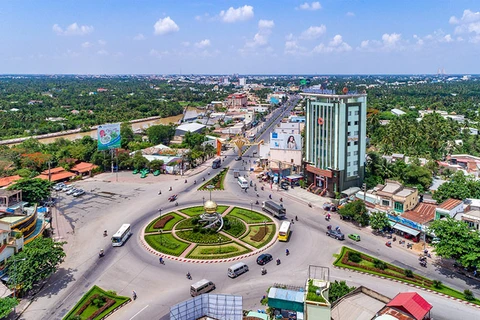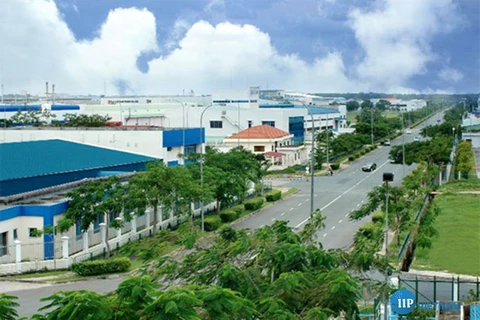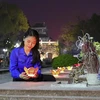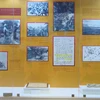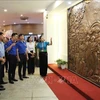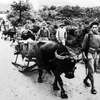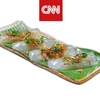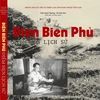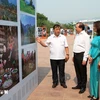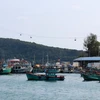Tien Giang (VNA) – The Mekong Delta province of Tien Giang has plenty of advantages to develop tourism, particularly agricultural and rural one. The province is home to many rivers, canals and more than 80,000 ha of specialty fruit orchards, traditional craft villages, and historical cultural relic sites. Tien Giang takes rural and garden ecological tours as one of its key tourism products to promote in the province.
Focusing on the development of specific products, the province is looking for ways to make a difference and form its own local brand on the basis of exploiting potential of ecotourism and marine tourism as a basic product which is in line with the green, clean and sustainable trend towards high-class and quality services.
Visitors to Tien Giang are attracted by tourism products with characteristics of agro-ecological culture such as the flood control zone, Dong Thap Muoi area, islets on Tien river, Go Cong coastal area, among others, which have left a good impression on visitors.
The Mekong Rustic Sau Van tourist site has an area of nearly 10 hectares with 15 standard rooms for guests to stay in and participate in activities of the people living in the countryside. This tourism product is continuing to be developed in many places such as Dong Hoa Hiep commune in Cai Be district, Phu Tan commune and Tan Phu Dong district, and Thanh Hoa commune in Tan Phuoc district.
Another famous place in Tien Giang which is known as the “Botanical Garden of the Rivers” is the Dong Tam Snake Farm in Chau Thanh district. With a large area covered with green canopies, this place is not only a conservation area for pythons and snakes, but also a home to a variety of birds and animals such as ostriches, ornamental birds, bears, leopards, and horses.
The province is also famous for its ancient house tourism model. Go Cong town is home to hundreds of ancient houses over 100 years old with unique East-West architecture such as the House of Governor Nguyen Van Hai built in 1860, Dinh Chanh Tham Bien or Governor’s Palace which was built in 1904.
In Cai Be district, Dong Hoa Hiep is one of the three ancient villages in Vietnam, along with Duong Lam village in Hanoi and Phuoc Tich village in Hue. These sites have been selected by the Vietnam National Administration of Tourism and the Japan International Cooperation Agency (JICA) to implement a project to “Support to promote the role of the community in sustainable development in Vietnam, through heritage tourism”.
According to Vice Chairman of the People’s Committee of Dong Hoa Hiep Commune Duong Van Phuong, the village has a total of seven hamlets with nearly 4,000 households, living mainly on specialty fruit orchards such as Hoa Loc mango, orange, green-skinned pomelo, longan, jackfruit and traditional crafts such as making green rice flakes, rice paper, and puff pastry.
The village still has 10 ancient houses, three pagodas and a communal house. Many old houses have been preserved, embellished and have existed for more than 100 years. On average, the ancient village welcomes about 100,000 visitors every year, more than 75% of them international visitors.
According to Deputy Director of the Department of Culture, Sports and Tourism of Tien Giang province Vo Pham Tan, in order to develop an effective and sustainable type of agricultural and rural tourism, the province will continue to plan to develop this type of tourism in areas of the province while strengthening the State management to ensure the implementation of the approved planning.
Tien Giang has implemented many incentives to promote investment in tourism development such as capital support, tax incentives, and human resources training to attract resources from businesses and farmers. Enterprises are an important factor in the process of linking, exploiting, and creating products with services that have local characteristics, increasing the attraction for tourists.
In order to improve the quality of destinations, the provincial Department of Culture, Sports and Tourism has supported owners of ancient houses and craft village households to improve the quality of tourism services and develop new tourist routes.
According to experts, in order to become a destination chosen by many tourists and get them to come back, Tien Giang province’s tourism industry needs to create more truly unique tourism products and develop the best quality supplementary services. They also need to effectively exploit the night economic model associated with cultural, art, and culinary characteristics to attract tourists.
Tien Giang supports finding markets, introducing products, and promoting agricultural tourism programmes through tourism fairs and exhibitions. They also look to advertise on social media, as well as through other media such as newspapers, leaflets, and photo books.
The province uses promotional activities in a number of popular foreign languages such as English and Chinese through international media based on the exploitation of the unique values of local tourism products./.

